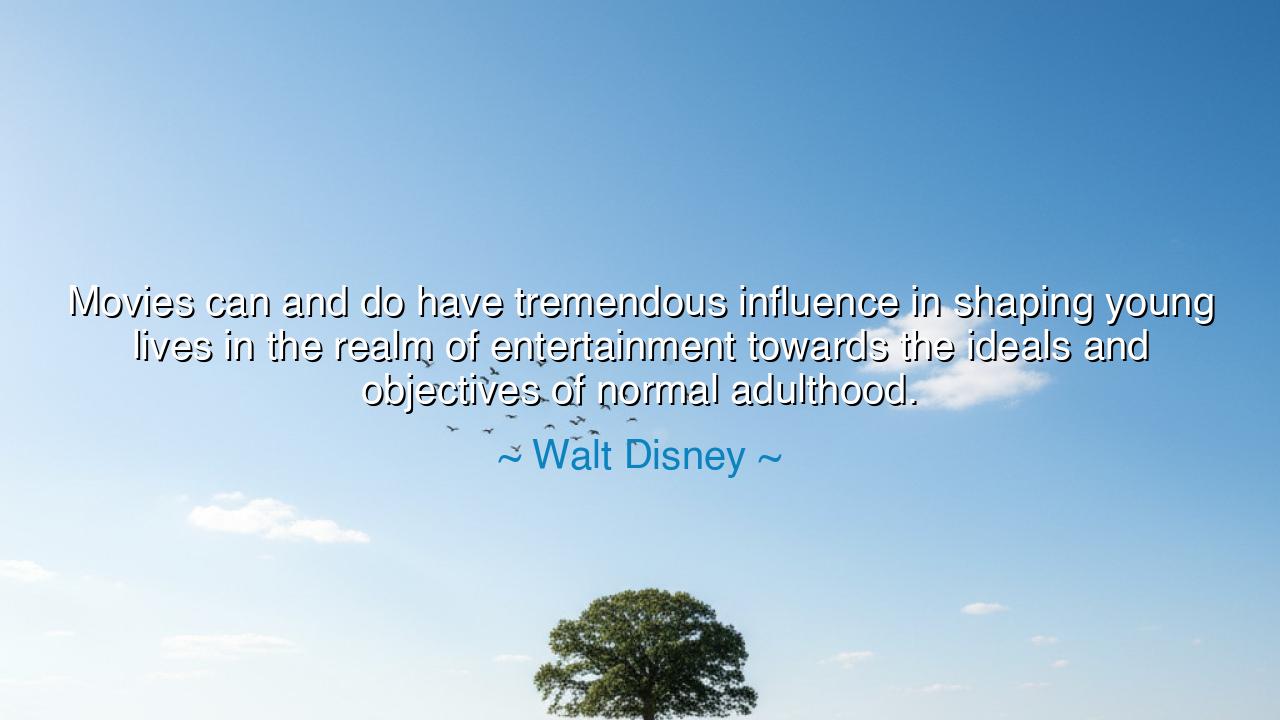
Movies can and do have tremendous influence in shaping young
Movies can and do have tremendous influence in shaping young lives in the realm of entertainment towards the ideals and objectives of normal adulthood.






"Movies can and do have tremendous influence in shaping young lives in the realm of entertainment towards the ideals and objectives of normal adulthood." — Walt Disney. In these words, Walt Disney, the visionary creator, speaks to the profound influence that stories, particularly those told through the medium of film, have upon the hearts and minds of the young. To understand the depth of his meaning, we must look beyond mere entertainment. Disney is revealing a powerful truth: that the images we consume, the tales we hear, and the heroes we admire, can shape the very course of our lives. The ideals of adulthood, of virtue, and of maturity, are often taught not through formal lessons or books, but through the cinema—those magical stories that reflect the journey of life itself.
Consider, if you will, the ancient world, where storytelling was the primary means of imparting wisdom. The great epic poems of Homer, like the Iliad and the Odyssey, were not mere tales of adventure. They were lessons in honor, courage, wisdom, and maturity. In the heroes of these tales—Achilles, Odysseus, and Hector—the young could see reflections of the very ideals they were meant to strive for. These epics, sung by bards and passed down through generations, shaped the minds of the youth, teaching them what it meant to live a life of duty, of self-discipline, and of bravery. Much as Disney suggests, the stories of old were not just for entertainment; they were the blueprints for growing up.
In Rome, Virgil’s Aeneid served the same function, depicting Aeneas’ struggles as he sought to fulfill his destiny and build a new city for his people. This was no mere narrative of a man’s journey; it was a story of piety, sacrifice, and the duty to one's family and country. The young Roman who read this epic did not simply experience the thrills of battle and adventure; they were imbued with the moral lessons necessary to become a respectable citizen of the Roman Empire. The stories of these ancient heroes became the foundation upon which young minds were built, guiding them towards the ideals and objectives of adulthood.
Walt Disney, in his own time, recognized the profound influence of storytelling, and particularly the power of film, to shape young lives. Take, for instance, the timeless tale of Cinderella—a story of perseverance, kindness, and the triumph of good over evil. Cinderella’s journey is not merely a fairy tale; it is a reflection of the values of patience, resilience, and hope. Through her story, the young are taught that while hardship may come, one’s character and virtue are what ultimately lead to success. In much the same way, the lessons imparted in The Lion King, Peter Pan, or even Snow White, speak to deeper themes of growth, responsibility, and morality. These films are not just stories; they are life lessons woven into the fabric of childhood, guiding the young toward a fuller understanding of adulthood.
Let us not forget the tale of Mulan, the courageous young woman who defied societal expectations to serve her family and country. Her story is one of sacrifice, honor, and courage—qualities that Disney knew would resonate with those who watched, especially the young who were just beginning to understand what it meant to live a life of duty. Like the heroes of old, Mulan’s journey is not merely one of adventure, but of self-discovery and growth. In the process of overcoming obstacles, she learns the true meaning of strength—not the strength of the body, but the strength of the heart and spirit. This is the essence of Disney's message: that the films we watch, especially as young people, can influence the development of character and guide us toward the ideals that are the bedrock of adulthood.
So, what lesson can we glean from Disney’s insight, and how can we apply it to our lives? The lesson is clear: the stories we tell, and the ones we choose to consume, have a profound impact on our development. Whether in the ancient epics or the films of today, these narratives are not mere distractions; they are mirrors to our own journeys, reflecting the virtues we should aspire to. If we are to grow into adulthood with integrity, wisdom, and purpose, we must be discerning in the stories we choose to follow. Just as the young of ancient Greece and Rome were shaped by the tales of their time, so too can the young of today be shaped by the films that teach them the values of courage, honor, kindness, and resilience.
As we move forward in life, let us remember the power of stories. Let us choose those that uplift us, that teach us what it means to live a life of meaning and purpose. Whether in the form of ancient epics or modern films, let us allow these narratives to guide us, to shape our understanding of adulthood, and to inspire us to become the best versions of ourselves. In doing so, we honor the timeless truth that, as Disney reminds us, the stories we tell—through film, through word, or through action—have the power to shape the future.






AAdministratorAdministrator
Welcome, honored guests. Please leave a comment, we will respond soon